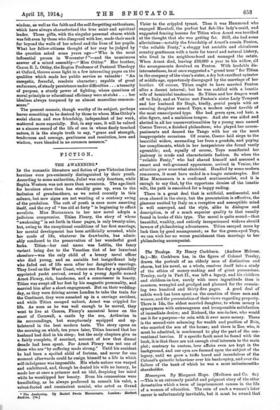The Tresleys. By Henry Cockburn. (Andrew Melrose. 6s.)—Mr. Cockburn has,
in the figure of Colonel Tresley, drawn the portrait of an elderly man of distinction and charm, but his novel, as a whole, resolves itself into a study of the ethics of money-making and of great possessions. Tresley, early in Part II., was left a legacy, and his children and children-in-law, surely with more ingratitude than is common, wrangled and grudged and planned for the remain- ing two hundred and thirty-five pages. A good deal of subtle work has been spent on the creation of these men and women, and the presentation of their views regarding property. There is Ida, the eldest married daughter, to whom money is synonymous with extravagance and irresponsible satisfaction of immediate desire; and Richard, the son-in-Jaw, who would use it for a purpose—to coin with it ever more money. There is the second-rate scheming for wealth and position of Erie, who married the son of the house; and there is Zoe, who, it must be admitted, is condemned to play the part of the con- ventional heroine. If a specific fault must be found with the book, it is that there are not enough rival interests to the main plot; contrary to custom, love affairs even are kept in the background, and our eyes nre focused upon the subject of the legacy, until we grow a trifle bored and incredulous of the Colonel's quixotic behaviour over his bankruptcy, and over the failure of the bank of which be was a most unbusinesslike shareholder.










































 Previous page
Previous page